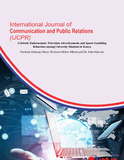Celebrity Endorsement: Television Advertisements and Sports Gambling Behavior among University Students in Kenya

View/
Date
2023-02Author
Oduor, N. O.
Mberia, H.
Ndavula, John O.
Metadata
Show full item recordAbstract
Purpose: To establish the influence of Television’s celebrity endorsement advertisement technique on sports gambling behaviour among the university students in Kenya. Methodology: This study employed mixed method design. In this case, convergent parallel mixed methods design was employed to evaluate the effects of Television’s celebrity endorsement advertisements on sports gambling behaviour among the university students in Nairobi County, Kenya. Both quantitative and qualitative data were collected at the same time after which the findings were integrated with an aim of generating overall results. Descriptive survey strategy was also used in the study. The quantitative data was analysed using descriptive and inferential statistics. Diagnostic test was first done to ascertain if the data used were normally distributed. As for this case, the following tests were conducted; skewness and kurtosis, histogram and normality plot curve, Kolmogorov Smirnov and Sharpiro Wilk test and Q-Q plot. Other tests included outlier test, collinearity diagnostics, correlation analysis, multicollinearity, autocorrelation, heteroscedasticity/ homoscedasticity and linearity test. The relationship between the variables was determined using a regression model. Findings: This study found out that there was a significant relationship between Celebrity endorsement and sports gambling behaviour among the university students in Nairobi County. In summary, technique of celebrity endorsement in television’s gambling advertisements had a positive influence in gambling activities among university students in Nairobi County. Unique Contribution to Theory, Practice and Policy: The study was embedded on the theory of planned behaviour. The core assumption of the theory is that there is a connection between beliefs and behaviour. In this case, the intention for a behaviour intent is influenced by three issues namely; assessment of the behaviour, apparent social pressure to perform or ignore a behaviour and the perceived degree of personal privilege concerning the behaviour (Dawkins and Frass, 2005). On its contribution to practice, the study calls on the universities to come up with proper sensitization programs to prevent the students from addictive gambling. The study further recommends that proper policy should be put in place by advertisers to provide clear messages on the dangers associated with addictive sports gambling. The overall findings will help policy makers to formulate policies that will control betting activities in the country.
